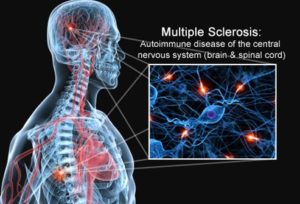To understand Multiple Sclerosis (MS) lets understand first it attacks the nervous system at the what we call the myelin shealth. The myelin sheath does this first the Myelin is a fatty white substance that surrounds the axon of some nerve cells, forming an electrically insulating layer. It is essential for the proper functioning of the nervous system. It is an outgrowth of a type of glial cell. The production of the myelin sheath is called myelination or myelinogenesis. The myelin sheath is a multi-layered membrane, unique to the nervous system, that functions as an insulator to greatly increase the efficiency of axonal impulse conduction.
Multiple sclerosis (MS) is a potentially disabling disease of the brain and spinal cord (central nervous system).
In MS, the immune system attacks the protective sheath (myelin) that covers nerve fibers and causes communication problems between your brain and the rest of your body. Eventually, the disease can cause the nerves themselves to deteriorate or become permanently damaged.
There’s no cure for multiple sclerosis. However, treatments can help speed recovery from attacks, modify the course of the disease and manage symptoms.
Multiple sclerosis signs and symptoms may differ greatly from person to person and over the course of the disease depending on the location of affected nerve fibers. They may include:
- Numbness or weakness in one or more limbs that typically occurs on one side of your body at a time, or the legs and trunk
- Partial or complete loss of vision, usually in one eye at a time, often with pain during eye movement
- Prolonged double vision
- Tingling or pain in parts of your body
- Electric-shock sensations that occur with certain neck movements, especially bending the neck forward (Lhermitte sign)
- Tremor, lack of coordination or unsteady gait
- Slurred speech
- Fatigue
- Dizziness
- Problems with bowel and bladder function
When to see a doctor
See a doctor if you experience any of the above symptoms for unknown reasons.


